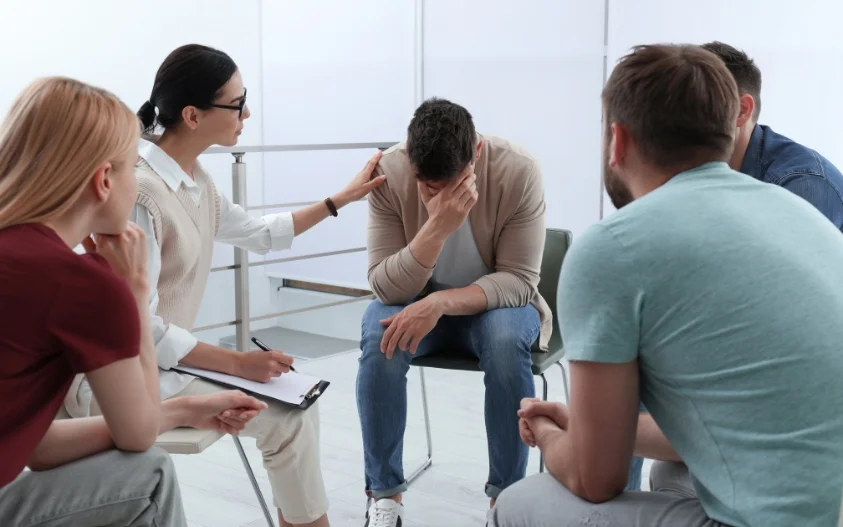24/7 Helpline:
(866) 899-221924/7 Helpline:
(866) 899-2219
Learn more about PTSD Treatment centers in Bradley County

Other Insurance Options

Evernorth

UnitedHealth Group

Health Net

Optum

CareSource

Ceridian

Ambetter

Health Choice

ComPsych

State Farm

GEHA

Multiplan

Holman Group

BHS | Behavioral Health Systems

Excellus

Choice Care Network

BlueCross

Sutter

Self-pay options

UMR

Behavioral Center – Residential
Behavioral Center – Residential is a private rehab located in Warren, Michigan. Behavioral Center – ...

Self – Help Addiction Rehab
Self-Help Addiction Rehab - Chicago Road offers outpatient and inpatient services for individuals wi...

Comprehensive Counseling Center
Comprehensive Counseling Center is committed to providing a broad range of high quality, innovative ...

The Salvation Army Harbor Light
The Salvation Army provides direct, compassionate service to East Michiganders in need, helping to r...

PsyCare – Howland Clinic
PsyCare – Howland Clinic is a private rehab located in Warren, Ohio. PsyCare – Howland Clinic specia...

Compass Family and Community Services – Riverbend Center
COMPASS Family and Community Services–Riverbend Clinic, in Warren, Ohio, is a mental health and dual...

Greentree Counseling Center
Greentree Counseling Center is a private rehab located in Warren, Ohio. Greentree Counseling Center ...

Specialty Care Counseling Services
Specialty Care Counseling Services is a private rehab located in Warren, Ohio. Specialty Care Counse...

VA Northeast Ohio Healthcare System – Warren VA Outpatient Clinic
Warren VA Multi-Specialty Outpatient Clinic provides primary health care to eligible veterans using ...

Meridian HealthCare
Meridian HealthCare is a community-based, non-profit organization located in Warren, OH. Meridian He...

Brightview – Warren Addiction Treatment Center
Brightview – Warren Addiction Treatment Center is a private rehab located in Warren, Ohio. Brightvie...

Spero Health – Warren
Spero Health – Warren is a private rehab located in Warren, Ohio. Spero Health – Warren specializes ...

First Step Recovery
First Step Recovery is a medically licensed subacute detox and treatment center for drug and alcohol...

Achievement Center
Achievement Center is a private rehab located in Warren, Pennsylvania. Achievement Center specialize...
Beacon Light Behavioral Health – Outpatient Services
Beacon Light Behavioral Health -- Outpatient Services is a private behavioral health treatment cente...

Deerfield Behavioral Health
Deerfield Behavioral Health is a unique group medical practice that provides a range of outpatient a...

Community Counseling Center
Community Counseling Center is a private rehab located in Hermitage, Pennsylvania. Community Counsel...

North American Family Institute – NAFI
North American Family Institute (NAFI) - Main Street is a group home young who acquire the skills ne...

New Beginnings Casa
New Beginnings Casa is a drug and alcohol rehab in Warren, Arkansas. They provide residential and ou...

Delta Counseling Associates – Warren
Delta Counseling Associates – Warren is a drug and alcohol rehab and counseling center in Warren, Ar...

Time Out Counseling
Time Out Counseling is a private rehab located in Warren, Michigan. Time Out Counseling specializes ...

Premier Services of Michigan
Premier Services of Michigan is a private rehab located in Warren, Michigan. Premier Services of Mic...

Sacred Heart Rehabilitation
Sacred Heart Rehabilitation is a private rehab located in Warren, Michigan. Sacred Heart Rehabilitat...

Saint John Hospital – Behavioral Health – Warren
Saint John Hospital – Behavioral Health – Warren is a private rehab located in Warren, Michigan. Sai...

Mercy Health – Behavioral Health Institute
Mercy Health – Behavioral Health Institute is a private rehab located in Warren, Ohio. Mercy Health ...

PsyCare – Main Avenue SW
PsyCare – Main Avenue SW is a private rehab located in Warren, Ohio. PsyCare – Main Avenue SW specia...

Travco Behavioral Health
Travco Behavioral Health offers outpatient services for people struggling with substance abuse or me...

Neil Kennedy Recovery Centers – Howland
Neil Kennedy Recovery Centers - Howland offers treatment for alcohol and drug problems for teens, ad...

Valley Counseling Services – Adult
Valley Counseling Services – Adult is a private rehab located in Warren, Ohio. Valley Counseling Ser...

Day Mont Behavioral Health Care
Day-Mont Behavioral Health Care provides treatment that focuses on the integration of primary and be...

First Step Recovery – Outpatient
First Step Recovery - Outpatient is a private treatment center for drug and alcohol addiction. First...

Warren General Hospital – Behavioral Health
Warren General Hospital – Behavioral Health is a private rehab located in Warren, Pennsylvania. Warr...




















































